The February survey asks several questions about America’s role in the Israel-Hamas war. To begin with, U.S. adults voice mixed opinions on whether President Joe Biden is favoring one side too much or striking the right balance. The largest share – a 40% plurality – say they are not sure. These views are largely unchanged from a previous poll in conducted in November and December 2023.
About as many Americans favor (36%) as oppose (34%) sending military aid to Israel. But public opinion tilts more strongly in favor of providing humanitarian aid to Palestinian civilians in Gaza, with 50% in favor and just 19% opposed. (This question was asked before the United States began airdropping food and other supplies in Gaza and announced plans to build a temporary port to allow aid to arrive by sea.)
In addition, a majority of Americans (55%) say the U.S. should play a role in diplomatic efforts to end the war – although the public is more inclined to want U.S. officials to play a minor (35%) rather than a major (20%) role in ending the war.
As with most issues related to the war, these attitudes vary significantly by age, political partisanship and religion, among other factors. This chapter explores the survey findings about U.S. policy in more detail.
Is Biden favoring one side too much or striking the right balance?
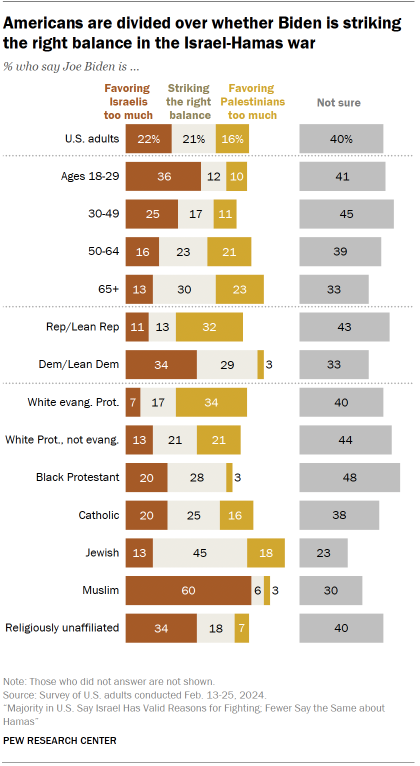
U.S. adults are divided about whether Biden is favoring the Israelis too much (22%), favoring the Palestinians too much (16%) or striking the right balance (21%) on the Israel-Hamas war. Fully 40% say they are not sure.
While overall views have changed little since we last asked this question in November and December 2023, the share of adults under 30 who feel Biden tilts too far toward Israel has risen 9 percentage points, from 27% to 36%.
Age
Young Americans (ages 18 to 29) are much more likely to say Biden is unduly favoring Israel than are older Americans. Adults ages 50 and older are more inclined than those under 30 to see Biden either as striking the right balance or as tilting too far toward the Palestinian side.
Party
About a third of Republicans and Republican-leaning independents (32%) say Biden favors the Palestinians too much, while 13% say he’s striking the right balance and 11% say he favors the Israelis too much.
Democrats and Democratic leaners are more divided between those who say the president is tilting too far toward Israel (34%) and those who feel he is striking the right balance (29%). Very few people in the Democratic camp say he favors the Palestinian side too much (3%).
Among both Republicans and Democrats, adults under 30 are more likely than those ages 50 and older in both parties to say Biden favors Israel too much. Almost half of young Democrats (48%) hold this view, as do about one-fifth of young Republicans (21%).
Religion
Of the religious groups large enough to be analyzed in the survey, Muslim Americans are by far the most likely to say Biden is favoring the Israelis too much (60%). About a third of religiously unaffiliated adults take the same stance, along with a fifth of both Catholics and Black Protestants.
A relatively high share of White evangelical Protestants (34%) say Biden is favoring the Palestinians too much. This is about twice the share of American Jews (18%) who say the same. The largest share of Jewish Americans (45%) say Biden is striking the right balance. And substantial shares of Americans across all religious categories say they aren’t sure.
America’s role in trying to end the war
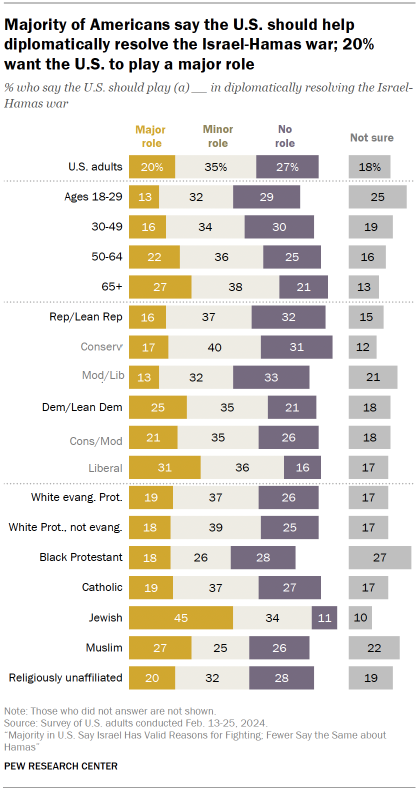
A majority of Americans say the U.S. should play a role in diplomatically resolving the Israel-Hamas war, though more want the U.S. to play a minor role than a major one (35% vs. 20%). Still, 27% would prefer that the U.S. play no role at all.
Religion
American Jews overwhelmingly see a role for the U.S. in resolving the Israel-Hamas war: 45% say the U.S. should play a major role, and an additional 34% say the U.S. should play a minor role in bringing the war to a close.
American Muslims also tend to favor a U.S. diplomatic effort to resolve the war, though they are almost evenly split over whether America should play a major or minor role (27% vs. 25%).
Age and party
Republicans and GOP leaners are more likely than Democrats and Democratic leaners to say the U.S. should not play any role in resolving the conflict (32% vs. 21%).
But about half or more in both parties want the U.S. to have at least some role. Democrats are more likely than Republicans to say the U.S. should play a major role (25% vs. 16%).
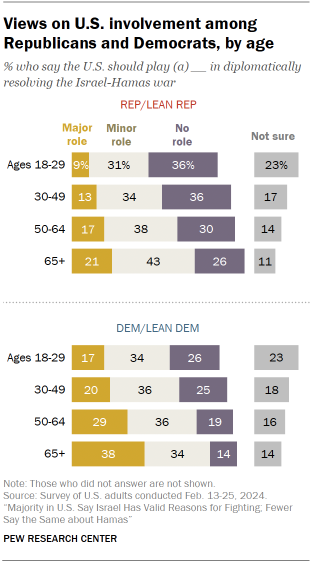
There are also big differences between age groups within both political parties.
Younger Republicans are somewhat more likely than their older counterparts to say the U.S. should play no role. And Democrats under 30 express less support than Democrats ages 50 and older for a major U.S. diplomatic effort to resolve the war. In part, these differences reflect the higher shares of young adults in both parties who say they aren’t sure what the U.S. should do.
Support for military aid to Israel
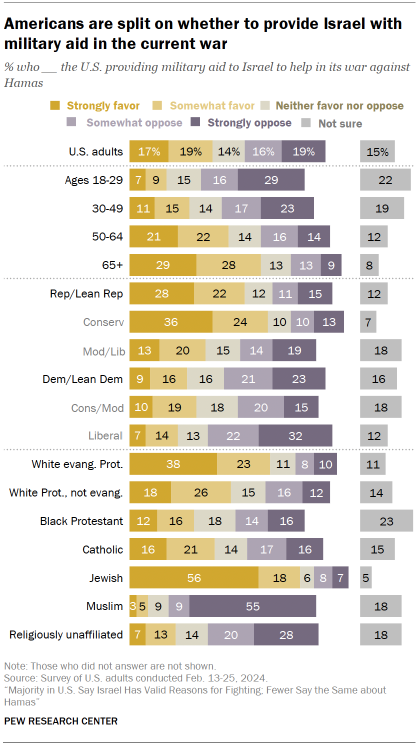
Nearly equal shares of Americans favor (36%) and oppose (34%) the U.S. providing military aid to Israel to help in its war against Hamas. An additional 14% neither favor nor oppose military aid to Israel, while 15% say they are unsure.
Age
Older Americans tend to be highly supportive of military aid to Israel. More than half of those ages 65 and older favor it, including 29% who are strongly in favor.
Conversely, 45% of adults under 30 oppose providing military aid to Israel, including 29% who strongly oppose it.
Party
Republicans and Republican leaners are more supportive of providing Israel with military aid than are Democrats and Democratic leaners. Half of Republicans favor military aid, with about three-in-ten saying they strongly favor it.
A plurality of Democrats (43%) oppose providing Israel with military aid for the war against Hamas, while a quarter support it.
Religion
Jewish Americans tend to be very supportive of the U.S. sending military aid to Israel to help in the war against Hamas, with 56% strongly favoring it. White evangelical Protestants also tilt heavily toward providing military aid, while Muslim Americans generally hold the opposite view. Indeed, 55% of Muslim adults surveyed strongly oppose the U.S. providing military aid to Israel.
Support for providing humanitarian aid in Gaza
The survey was conducted Feb. 13-25, before the U.S. began airdropping aid into Gaza and announced plans to build a port off the coast of Gaza.
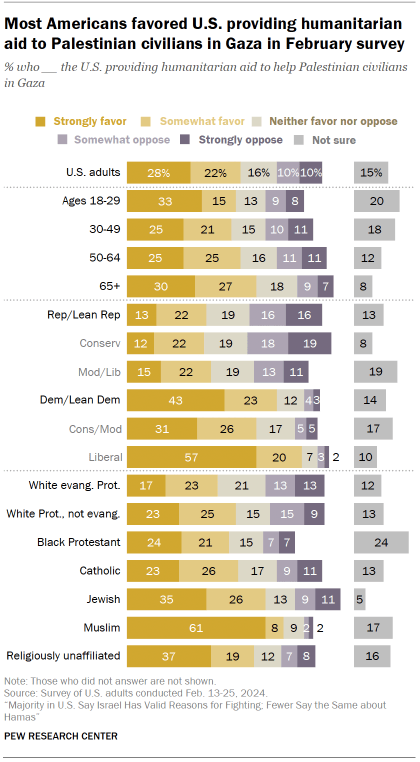
At the time of the survey, half of Americans said they favored providing humanitarian aid for Palestinian civilians in Gaza, including 28% who strongly favored it. About one-in-five U.S. adults opposed sending aid to Gaza, while 16% said they neither favored nor opposed it, and 15% were unsure.
Age
Differences between age groups on this question are relatively small and are related, in large part, to younger Americans being more likely to say they are unsure.
Party
In the February survey, approximately two-thirds of Democrats and Democratic-leaning independents favored providing humanitarian aid to Gaza, while fewer than one-in-ten opposed it.
Republicans and Republican leaners were divided: 35% favored providing humanitarian aid to Gazans, while 33% opposed it.
Religion
A majority of U.S. Muslims supported sending humanitarian aid for civilians in Gaza, including 61% who strongly favored it. Most U.S. Jews and religiously unaffiliated Americans also supported providing humanitarian aid at the time of the survey, including around a third or more in each group who strongly favored it.
Overlapping support for aid to Israel and Gaza
Combining these questions shows that, at the time of the survey – in February 2024, before the United States began airdropping humanitarian supplies into Gaza – Americans were deeply divided over U.S. foreign aid related to the Israel-Hamas war.
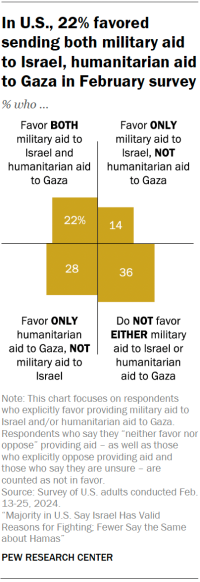
In the survey, 22% supported providing aid to both Israel and Gaza. About three-in-ten favored only humanitarian aid for Palestinian civilians, while 14% favored only military assistance for Israel. An additional 36% did not support providing either kind of aid.3
- Older Americans are the most likely to support providing aid to both the Israeli military and Palestinian civilians in Gaza. Among those ages 65 and older, a 35% plurality favored this in the February survey.
- Younger adults are more likely than older Americans to not support U.S. aid for either Israel or Gaza. Among those ages 18 to 29, 46% did not explicitly endorse either kind of aid in the survey.
- Among young adults who do want the U.S. to provide aid, however, there’s a strong tilt toward aid for Gaza: 38% of adults under 30 supported only humanitarian aid for Palestinian civilians, compared with 6% who supported only military aid for Israel. Another 11% supported both types of aid.
- Among Republicans and GOP leaners, the largest share (39%) did not support either type of foreign aid when asked about this in the February survey. Still, 26% favored sending only military aid to Israel, and an additional 24% wanted the U.S. to provide both military assistance to Israel and humanitarian aid to civilians in Gaza.
- Among Democrats and Democratic leaners, a 45% plurality favored providing only humanitarian aid to Gaza. But substantial numbers did not support either kind of aid (30%) or supported both kinds (21%). Just 4% favored only military aid to Israel.
Some findings by religion:
- Among Jewish Americans, the largest share (45%) favored providing both military aid to Israel and humanitarian aid to Palestinian civilians in Gaza. However, about a third supported only military aid for Israel, while 16% supported only humanitarian aid for Gaza.
- Muslim Americans overwhelmingly favor providing only humanitarian aid to Palestinians in Gaza: 63% expressed this view in the February survey, while just 6% supported sending both kinds of aid.




